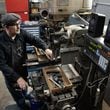Researchers from the United Kingdom have launched a clinical trial for a breathalyzer-like cancer test that may be able to detect multiple cancers via chemical changes in the breath.
» RELATED: New 10-minute cancer test can reveal traces of disease
Such breath tests have been previously examined for several cancers, including lung, colon, prostate and esophageal cancers, but scientists hope this single 10-minute breath test may be able to detect several types at a time.
"There is increasing potential for breath-based tests to aid diagnosis, sitting alongside blood and urine tests in an effort to help doctors detect and treat disease," Billy Boyle, co-founder and CEO of Owlstone Medical and its Breath Biopsy technology used for multiple cancer detection, said in a statement. "The concept of providing a whole-body snapshot in a completely non-invasive way is very powerful and could reduce harm by sparing patients from more invasive tests that they don't need."
» RELATED: Scientists develop blood test to detect, find cancer
The trial, led by Rebecca Fitzgerald of the Cancer Research UK Cambridge Centre, will amass up to 1,500 participants through 2021, including a healthy control group.
How it works
The painless, non-invasive 10-minute breathalyzer test will detect amounts of volatile organic compounds — aldehydes or ketones, for example — usually produced in the body’s metabolic processes and found in exhaled breath. Because cancerous cells are known to produce different patterns (or signatures) of VOCs, researchers hope the test will be able to ascertain signature indicators of cancer.
Through the trial, the scientists seek to find such signatures in breath molecules of both healthy people and people with suspected esophageal, stomach, prostate, kidney, bladder, liver or pancreatic cancer.
» RELATED: Don't wait: Everything to know about cancer screenings
"This is a pilot study, so first we're looking at a range of cancers to see if we get a signal and compare the signal to healthy individuals," Fitzgerald said in a Cancer Research UK blog. "Intuitively, lung cancer seems the most obvious cancer to be detected in the breath, but because of the way metabolites are recycled in the body, many other volatile molecules from other areas of the body end up in the breath too."
If the Owlstone tech can help differentiate cancer signatures and healthy ones, “the team will next see if there are differences between cancer types, or if there’s just one ‘cancer signature,’” according to the blog.
Fitzgerald and her team hope the breath test may have the potential to be used as a screening tool in the wider population, though multiple studies must confirm benefits outweigh any potential risks.
Read more about the trials at scienceblog.cancerresearchuk.org.
About the Author






